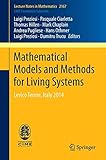Mathematical Models and Methods for Living Systems [electronic resource] : Levico Terme, Italy 2014 / by Pasquale Ciarletta, Thomas Hillen, Hans Othmer, Luigi Preziosi, Dumitru Trucu ; edited by Luigi Preziosi, Mark Chaplain, Andrea Pugliese.
Material type: TextSeries: C.I.M.E. Foundation Subseries ; 2167Publisher: Cham : Springer International Publishing : Imprint: Springer, 2016Edition: 1st ed. 2016Description: XI, 321 p. 111 illus., 78 illus. in color. online resourceContent type: text Media type: computer Carrier type: online resourceISBN: 9783319426792Subject(s): Biomathematics | Medicine | Applied mathematics | Engineering mathematics | Mathematical and Computational Biology | Biomedicine, general | Applications of MathematicsAdditional physical formats: Printed edition:: No title; Printed edition:: No titleDDC classification: 570.285 LOC classification: QH323.5QH324.2-324.25Online resources: Click here to access online
TextSeries: C.I.M.E. Foundation Subseries ; 2167Publisher: Cham : Springer International Publishing : Imprint: Springer, 2016Edition: 1st ed. 2016Description: XI, 321 p. 111 illus., 78 illus. in color. online resourceContent type: text Media type: computer Carrier type: online resourceISBN: 9783319426792Subject(s): Biomathematics | Medicine | Applied mathematics | Engineering mathematics | Mathematical and Computational Biology | Biomedicine, general | Applications of MathematicsAdditional physical formats: Printed edition:: No title; Printed edition:: No titleDDC classification: 570.285 LOC classification: QH323.5QH324.2-324.25Online resources: Click here to access online  E-BOOKS
E-BOOKS
| Current library | Home library | Call number | Materials specified | URL | Status | Date due | Barcode |
|---|---|---|---|---|---|---|---|
| IMSc Library | IMSc Library | Link to resource | Available | EBK15789 |
Preface -- Cell-based, continuum and hybrid models of tissue dynamics -- The Diffusion Limit of Transport Equations in Biology -- Mathematical Models of the Interaction of Cells and Cell Aggregates with the Extracellular Matrix -- Mathematical modeling of morphogenesis in living materials -- Multiscale computational modelling and analysis of cancer invasion.
The aim of these lecture notes is to give an introduction to several mathematical models and methods that can be used to describe the behaviour of living systems. This emerging field of application intrinsically requires the handling of phenomena occurring at different spatial scales and hence the use of multiscale methods. Modelling and simulating the mechanisms that cells use to move, self-organise and develop in tissues is not only fundamental to an understanding of embryonic development, but is also relevant in tissue engineering and in other environmental and industrial processes involving the growth and homeostasis of biological systems. Growth and organization processes are also important in many tissue degeneration and regeneration processes, such as tumour growth, tissue vascularization, heart and muscle functionality, and cardio-vascular diseases.


There are no comments on this title.